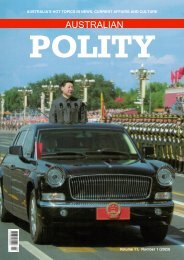Australian Polity, Volume 10 Number 1 & 2
March 2022 issue of Australian Polity
March 2022 issue of Australian Polity
- No tags were found...
Create successful ePaper yourself
Turn your PDF publications into a flip-book with our unique Google optimized e-Paper software.
The first lesson in analysing the Chinese Communist
Party is to recognise that everything written and
said is self-serving. It is in the service of the Party
itself, and, increasingly, its leader, Xi Jinping.
All nations seek to advance their own sovereign interests,
but the most successful ones recognise that compliance
with an international rules-based order generates
advantages for all and compounds the benefits. China
however proclaims one thing but does another. There
are many examples.
When Xi Jinping stood next to Barack Obama and
proclaimed that he would not militarise the artificial
islands in the South China Sea, the CCP was already
building military installations on them.
The Party’s recent 100th anniversary publication, The
CCP - Its Mission and Contributions, is replete with further
examples. ‘China has strictly enforced international
conventions such as the Paris Agreement, the Convention
on Nuclear Safety, the Treaty on Non-Proliferation of
Nuclear Weapons, the Convention on the Prohibition
of the Development, Production and Stockpiling of
Bacteriological (Bacterial) and Toxin Weapons and on
their Destruction . . . it has actively engaged in international
exchanges and cooperation under the UN framework in
such fields as . . . cyber security and biosafety, as well
as polar, outer space and ocean affairs.’
Compare these claims to China’s actions in rapidly building
coal fired power stations, constructing new nuclear missile
silos, developing hypersonic weapons, and snubbing
international rulings on the South China Sea. And what
about the gain-of-function biological research in Wuhan
that is most likely the cause of the COVID-19 pandemic?
These matters are significant when assessing China’s
statements of future intent, such as requesting to join
the Comprehensive and Progressive Agreement for
Trans-Pacific Partnership free-trade agreement (CPTPP).
Responding to the news that China had applied to join
both 11-nation free trade arrangement, the respected
commentator, Paul Kelly, asked ‘is Australia a dumb
country in diplomatic terms or can we exploit the golden
opportunity Beijing has given us?’
He went on to write: ‘The worst mistake Australia could
make would be to rigidly oppose China outright - that is
what the China hawks in this country will demand. They
need to be repudiated.’ But the material distinction over
China is between the realists and the wishful thinkers.
As Kelly acknowledges, ‘China would need to make a
range of economic reforms in state-owned enterprises
and pro-market practices’ and ‘China’s entry would
not be acceptable unless it adhered to World Trade
Organisation rules, honoured its current free trade
agreements with member nations and, obviously, engaged
during negotiations at ministerial and official level with
all members.’
Under Xi Jinping, the market is being significantly
restrained. Even private enterprise is being brought
under the control of the CCP, with a policy of placing
Party representatives on governing boards. The role
of state-owned enterprises has been strengthened,
not diluted. Increasingly, many foreign investors regard
China as a risk.
In a recent statement on the WTO Trade Review of China,
Australia was frank. ‘’China has increasingly tested global
trade rules and norms by engaging in practices that are
inconsistent with its WTO commitments. Australia is one
of numerous WTO members that has experienced this
firsthand. . . there is a growing body of information that
demonstrates China’s actions are motivated by political
considerations.’ The Statement continued: ‘China has
assured Members of its commitment to the rules-based
order; but from our viewpoint there is a growing gap
between China’s rhetoric and its actions.’
The boundary between the state and business enterprises
has become blurred increasingly under Xi. Tensions are
resolved in favour of the State. Further examples arise
almost every week. Hong Kong has quietly widened the
language of its national security law from actions that
‘endanger national security’ to ‘contrary to the interests
of national security.’ No wonder many foreign firms are
considering moving elsewhere. Chinese courts have
upheld anti-suit injunctions against foreign firms seeking
to make claims for patent infringements while cyberenabled
Intellectual property theft continues unabated.
34 Australian Polity





